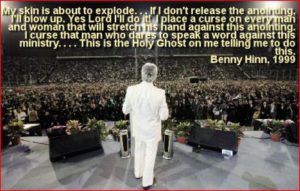 Article: Frequently Abused Verses: Did God Forbid us to Critique or Criticize Church Leaders? (Psalm 105:15; 1 Samuel 24:10) by Cameron Buettel (original source here)
Article: Frequently Abused Verses: Did God Forbid us to Critique or Criticize Church Leaders? (Psalm 105:15; 1 Samuel 24:10) by Cameron Buettel (original source here)
False teaching thrives in environments where it is unlikely to be questioned. Charlatans and heretics prey on uncritical minds, and work tirelessly to protect and preserve that gullibility. Their success depends on dismantling every challenge to their authority and accuracy.
John MacArthur describes why that problem is rampant in the modern church:
In a time like this of tolerance, listen, false teaching will always cry intolerance; it will always say you’re being divisive, you’re being unloving, you’re being ungracious, because it can only survive when it doesn’t get scrutinized. And so it cries against any intolerance. It cries against any examination, any scrutiny.
In recent decades, some of the most notorious charismatic church leaders have been doing just that. They continually warn their critics to back off or face the imminent danger of divine judgment. Claiming God’s stamp of approval, they wield Psalm 105:15 like a loaded gun: “Touch not [the Lord’s] anointed” (KJV).
And lest you think such a description to be hyperbole, the following clip from Benny Hinn is a spectacular example.
Hinn’s handling of Psalm 105:15, as well as the story of Saul and David, is hopelessly wrong on too many levels to address in one blog post.
For example we could discuss how Hinn utterly fails to understand Judas’s role in God’s sovereign plan for the crucifixion, while woefully underestimating the deity of Christ. We could invalidate Hinn’s warnings against criticism by pointing out the time Paul rebuked Peter—or when Hinn has publicly rebuked Joel Osteen, among others. Then there’s the problem of Hinn basing his threats upon the extra-biblical revelation of another false teacher (Kenneth Copeland).
What does it mean to “touch”?
But there is one simple, glaring error that explains all the other problems and exposes Hinn as the incompetent and unqualified Bible teacher that he is. When David says, “I will not stretch out my hand against [Saul], for he is the Lord’s anointed” (1 Samuel 24:10), he is explaining why he didn’t kill Saul, not why he didn’t criticize Saul. In fact, David was openly critical of Saul on numerous occasions. Moreover, 1 Samuel 24:10 is part of a larger discourse where David rebukes Saul face-to-face over his murderous scheming: “I have not sinned against you, though you are lying in wait for my life to take it. May the Lord judge between you and me, and may the Lord avenge me on you; but my hand shall not be against you” (1 Samuel 24:11–13). Even if Benny Hinn was “the Lord’s anointed”—he’s not—none of his critics are attempting to “touch” him in the sense described in 1 Samuel 24:10 (or Psalm 105:15; or 1 Chronicles 16:22).
Who are the anointed?
There is another fatal flaw in Hinn’s interpretation. He—and all those who follow this teaching—assume that only certain persons are “anointed.” They claim that pastors and self-appointed prophets and apostles have a unique anointing from God that immunizes them from criticism. But such a concept is foreign to Scripture. In short, the Bible teaches that all believers have an anointing from God.
In his first epistle, the apostle John explained what it means to be anointed as a New Testament believer. After warning his readers about antichrists who were coming to deceive them, John reminded them of their security because of Christ’s anointing:
These things I have written to you concerning those who are trying to deceive you. As for you, the anointing which you received from Him abides in you, and you have no need for anyone to teach you; but as His anointing teaches you about all things, and is true and is not a lie, and just as it has taught you, you abide in Him. (1 John 2:26–27)
The anointing John refers to is the indwelling of the Holy Spirit—a reality for all true Christians. John MacArthur explains the context and meaning of “anointing” as it appears in 1 John:
The false teachers who threatened John’s readers employed the terms for knowledge and anointing to describe their religious experience. They arrogantly saw themselves as possessing an elevated and esoteric form of divine knowledge, and as the recipients of a special, secret, transcendent anointing. That led them to believe they were privy to truth that the uninitiated lacked. John’s response, which was both a rebuttal to the antichrists and a reassurance to the believers, was to assert that, in reality, all true Christians have an anointing from the Holy One.
Because believers have received that anointing, they have the true understanding of God that comes exclusively through Jesus Christ (2 Corinthians 4:6), “in whom are hidden all the treasures of wisdom and knowledge” (Colossians 2:3). They do not need any secret, special, or transcendent understanding or esoteric insight. Anointing (chrisma) literally means “ointment” or “oil” (cf. Hebrews 1:9). In this text it refers figuratively to the Holy Spirit (cf. 2 Corinthians 1:21–22), who has taken up residency in believers at the behest of Jesus Christ, the Holy One (cf. Luke 4:34; Acts 3:14), and reveals through Scripture all they need to know (John 14:26; 16:13; 1 Corinthians 2:9–10). (John MacArthur, The MacArthur New Testament Commentary: 1–3 John (Chicago, IL: Moody Press, 2007), 102.)
The anointing we have as believers reveals the truth and therefore exposes the lies of false teachers. How ironic that the “anointing” Benny Hinn evokes to extort and manipulate churchgoers is actually our warning system to expose the self-serving deception of wolves like him.

